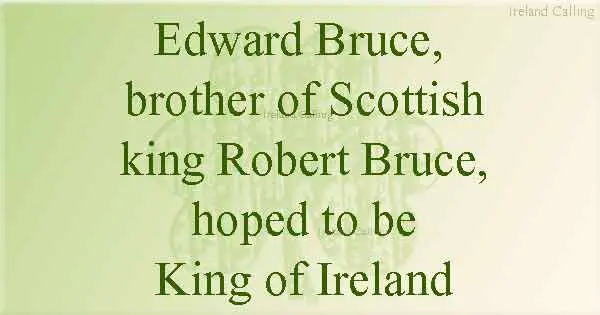Edward Bruce was a Scottish nobleman who went to Ireland in an attempt to liberate the country from the Normans. During his campaign to become King of Ireland he contributed to the fall of the Normans in the country.
the_Normans_in_text.html
Edward was the brother of the Scottish King, Robert Bruce. The two had fought together to regain Scottish independence from the English.
Having defeated the English at the Battle of Bannockburn in 1314, Robert wrote to the Irish kings, expressing his wish that Edward should travel across the Irish Sea to become their leader.

Robert and Edward wanted to form a powerful alliance
The plan was for the Scots to help free their Celtic neighbours from the Normans, who by now had become integrated with the English. The Scottish, led by Robert, and the Irish, led by Edward, would create a powerful alliance.
However, it was likely that the Bruces had an ulterior motive in that a stronger Ireland would cause greater distractions for the English and therefore help the Scots cement their independence.
Robert Bruce later vowed to the English that he would not get involved in any Anglo-Irish conflict on the proviso that the crown acknowledged Scottish independence.
In 1315, Edward was invited by the Ulster Irish to take the Kingship of Ireland. He took a huge fleet of 200 ships to Ireland and captured Dundalk. Soon after he took control of Ulster and Connacht. He had ambitions to become the High King and continued to march south. He had the support of much of the Irish population. However, this support would not last.
In February 1317, Edward attempted to capture Dublin but was unable to do so as the city leaders ordered every citizen living outside the city walls to come inside. Then the suburbs on the outside of the walls were burned down.
This drastic action bought some time to allow the English forces to travel across the Irish Sea to the aid of Dublin. Bruce decided not to besiege the city and withdrew.
European famine hindered Edward’s forces
There was a terrible famine affecting Europe at the time which made it difficult for Edward’s forces to continue to march through the country. They took food from the local Irish communities which made them increasingly unpopular.
Edward headed back to the north and prepared for another attempt at expansion. However, he had lost the support of the Irish, who had begun to see the Scots as no better than the English.
King Edward II of England then sent money over to help the Normans see off the threat from Edward Bruce once and for all.
Edward Bruce died in 1318 in the Battle of Faughart, near Dundalk. Despite his death, Edward had weakened the Norman hold over Ireland as many Gaelic chiefs had gained territory during those three years.
the_Normans.html
